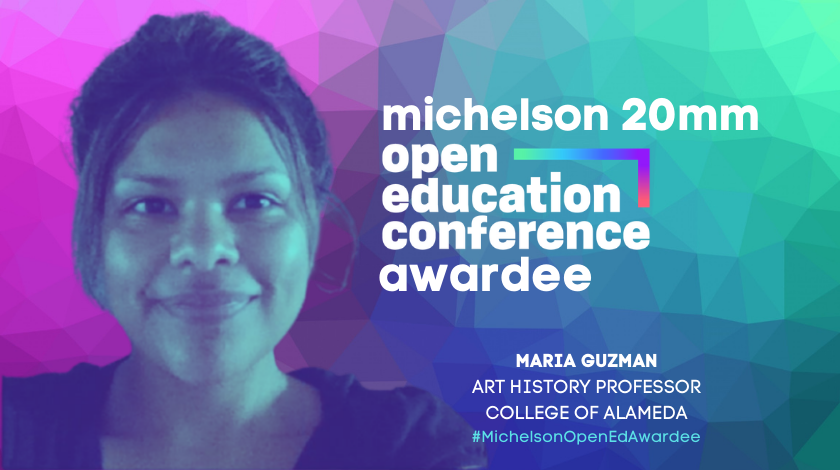Over the next few weeks we will be sharing reflections from our scholarship recipients on their experiences at this year’s Open Education Conference. Today we are featuring Maria Guzman, an art history faculty from the College of Alameda.
Wow, I had no idea just how much I missed the open education community! Last year, I was fortunate to attend the Open Education Conference and found the people to be exceptionally welcoming and friendly. Attendees weren’t shy about approaching me to exchange contact information and share their ideas on open education. For the first time as a part-time art history professor, I felt like I had found my place in the unique world of higher learning.
Over the course of the previous year, I joined a group of faculty across my district whose work in promoting open education I’ve quickly come to admire. Guided by the Peralta Online Equity Rubric principles, we’ve accomplished some lofty and notable goals. Being part of a community of like-minded faculty has helped me develop confidence in my professional self, and I was beyond thrilled to connect with my fellow educators at last week’s 2020 OpenEd Conference.
I decided to participate in the Tuesday workshops which started the week on a hopeful and inspiring note. A talk titled Equitable Emergence: Telling the Story of “Equity Unbound” in the Open intrigued me as did a rousing discussion on “embracing the emerging.” I was able to lend my thoughts on the continuing “Imagining A Socially Just Academia” project, and attended a presentation promoting Liberatory Open Education. These creative manifestos really tingled the art historian in me. And I can’t forget to mention, ISKME presented their recent project which seeks to guide faculty amidst our current pandemic. It was so encouraging to see that this important work is taking place.
My dive into the intersection of open education and art history continued with Wednesday’s session on Open Art Histories: Reimagining How We Teach Visual and Material Cultures. The presenters contextualized the topic and I appreciated their inclusion of Indigenous Peoples’ land acknowledgements in their research and practice. The following day, I ran into some familiar faces at a diversity, equity, and inclusion (DEI) themed workshop. The event centered on how open educational resources (OER) can work collaboratively with DEI initiatives – CCCOER Equity, Diversity, and Inclusion Committee was highlighted as a great example. My passion for OER and its potential to increase access to higher education grew even stronger during the talk on Looking Beyond Cost: OER as Intentionally Engaged Social Justice.
The 2020 OpenEd Conference provided me with a wealth of resources on all things OER, and I can’t wait to delve further into them and elevate my expertise. I’ve already made plans to share what I’ve learned and experienced with my Peralta community. After such an informative week, I feel more gratified about what we’ve accomplished so far and confident in what we can achieve moving forward as a larger community.

